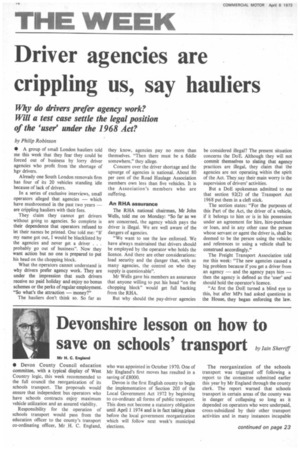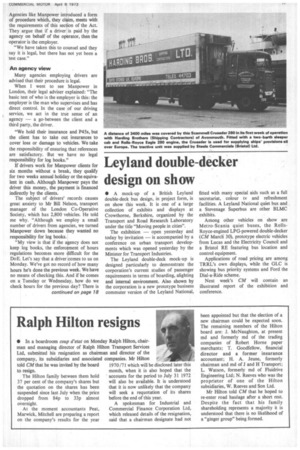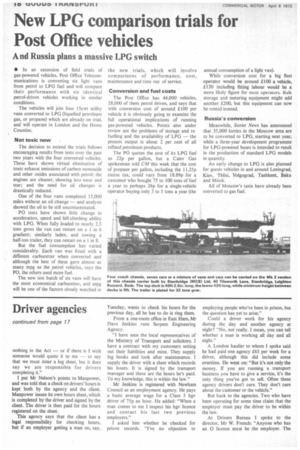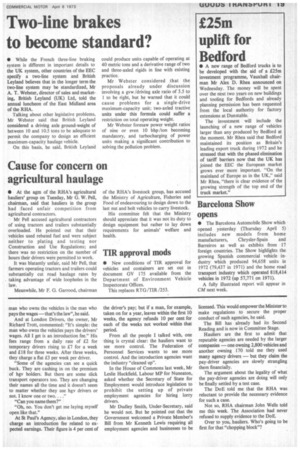Driver agencies are crippling us, say hauliers
Page 18

Page 19

Page 20

Page 21

If you've noticed an error in this article please click here to report it so we can fix it.
Why do drivers prefer agency work?
Will a test case settle the legal position of the 'user' under the 1968 Act?
by Philip Robinson
• A group of small London hauliers told me this week that they fear they could be forced out of business by lorry driver agencies who profit from the shortage of hgv drivers.
Already one South London removals firm has four of its 20 vehicles standing idle because of lack of drivers.
In a series of exclusive interviews, small operators alleged that agencies — which have mushroomed in the past two years — are crippling hauliers with their fees.
They claim they cannot get drivers without going to agencies. So complete is their dependence that operators refused to let their names be printed. One told me: "If my name got out, I would be blacklisted by the agencies and never get a driver . . . probably go out of business". Now they want action but no one is prepared to put his head on the chopping block.
What the operators cannot understand is why drivers prefer agency work. They are under the impression that such drivers receive no paid holiday and enjoy no bonus schemes or the perks of regular employment. "So what's the attraction — money?"
The hauliers don't think so. So far as they know, agencies pay no more than themselves. "Then there must be a fiddle somewhere." they allege.
Concern over the driver shortage and the upsurge of agencies is national. About 80 per cent of the Road Haulage Association members own less than five vehicles. It is the Association's members who are suffering.
An RHA assurance
The RHA national chairman, Mr John Wells, told me on Monday: "So far as we are concerned, the agency which pays the driver is illegal. We are well aware of the dangers of agencies.
"We want to see the law enforced. We have always maintained that drivers should be employed by the operator who holds the licence. And there are other considerations: load security and the danger that, with so many agencies, the control on who they supply is questionable".
Mr Wells gave his members an assurance that anyone willing to put his head "on the chopping block" would get full backing from the RHA.
But why should the pay-driver agencies be considered illegal? The present situation concerns the DoE. Although they will not commit themselves to slating that agency practices are illegal, they claim that the agencies are not operating within the spirit of the Act. They say their main worry is the supervision of drivers' activities.
But a DoE spokesman admitted to me that section 92(2) of the Transport Act 1968 put them in a cleft stick.
The section states: "For the purposes of this Part of the Act, the driver of a vehicle, if it belongs to him or is in his possession under an agreement for hire, hire-purchase or loan, and in any other case the person whose servant or agent the driver is, shall be deemed to be the person using the vehicle; and references to using a vehicle shall be construed accordingly."
The Freight Transport Association told me this week: "The new agencies caused a big problem because if you get a driver from an agency — and the agency pays him — then the agency is defined as the 'user' and should hold the operator's licence.
"At first the DoE turned a blind eye to this, but after MPs had asked questions in the House, they began enforcing the law. Agencies like Manpower inti.oduced a form of procedure which, they drum, meets with the requirements of this section of the Act. They argue that if a driver is paid by the agency on behalf of the operator, then the operator is the employer.
"We have taken this to counsel and they say it is legal, but there has not yet been a test case."
An agency view
Many agencies employing drivers are advised that their procedure is legal.
When I went to see Manpower in London, their legal adviser explained: "The basic test of who is the employer is this: the employer is the man who supervises and has direct control. In the case of our driving service, we act in the true sense of an agency — a go-between the client and a third party, the driver.
"We hold their insurance and P45s, but the client has to take out insurances to cover loss or damage to vehicles. We take the responsibility of ensuring that references are satisfactory. •But we have no legal responsibility for log books."
If drivers work for Manpower clients for six months without a break, they qualify for two weeks annual holiday or the equivalent in cash. Although Manpower pays the driver this money, the payment is financed indirectly by the clients.
The subject of drivers' records causes great anxiety to Mr Bill Nelson, transport manager of the London Co-Operative Society, which has 2,800 vehicles. He told me why. "Although we employ a small number of drivers from agencies, we turned Manpower down because they wanted no responsibility for log books.
"My view is that if the agency does not keep log books, the enforcement of hours regulations becomes more difficult for the DoE. Let's say that a driver comes to us on Monday. We've got no record of how many hours he's done the previous week. We have no means of checking this. And if he comes on a Tuesday or Wednesday, how do we check hours for the previous day? There is
nothing in the Act — or if there is I wish someone would quote it to me — to say that we must issue a log sheet, but it does say we are responsible for drivers completing it."
I put Mr Nelson's points to Manpower, and was told that a check on drivers' hours is kept both by the agency and the client. Manpower issues its own hours sheet, which is completed by the driver and signed by the client. The driver is then paid for the hours registered on the sheet.
This agency says that the client has a legal responsibility for checking hours, but if an employer getting a man on, say, Tuesday, wants to check his hours for the previous day, all he has to do is ring them.
From a one-room office in East Ham, Mr Dave Jenkins runs Serpent Engineering Agency.
"I have seen the local representatives of the Ministry of Transport and solicitors. I have a contract with my customers setting out their liabilities and mine. They supply log books and look after maintenance. I supply the driver with a sheet which records his hours. It is signed by the transport manager and these are the hours he's paid. To my knowledge, this is within the law."
Mr Jenkins is registered with Newham Council as an employment agency. He pays a basic average wage for a Class 3 hgv driver of 75p an hour. He added: "When a man comes to me I inspect his hgv licence and contact his last two previous employers."
I asked him whether he checked for prison records. "I've no objection to employing people who've been in prison, but the question has yet to arise."
Could a driver work for his agency during the day and another agency at night? "No, not really. I mean, you can tell whether a man is working all day and all night."
A London haulier to whom I spoke said he had paid one agency £65 per week for a driver, although this did include some overtime. He went on: "But it's not only the money. If you are running a transport business you have to give a service, it's the only thing you've got to sell. Often these agency drivers don't care. They don't care about the customer or the vehicle."
But back to the agencies. Two who have been operating for some time claim that the employer must pay the driver to be within the law.
At Drivers Bureau I spoke to the director. Mr W. French: "Anyone who has an 0 licence must be the employer. The man who owns the vehicles is the man who pays the wages —that's the law", he said.
And at London Drivers, the owner, Mr Richard Trott, commented: "It's simple: the man who owns the vehicles pays the drivers' wages. All I get is an introduction fee." His fees range from a daily rate of £2 for temporary drivers rising to £7 for a week and £18 for three weeks. After three weeks, they charge a flat £3 per week per driver.
"Some of the agencies can see a quick buck. They are cashing in on the premium of hgv holders. But there are some slick transport operators too. They are changing their names all the time and it doesn't seem to matter whether they use hgv drivers or not. I know one or two...."
"Can you name them?"
"Oh, no. You don't get me laying myself open like that."
At St Paul's Agency, also in London, they charge an introduction fee related to expected earnings. Their figure is 4 per cent of the driver's pay; but if a man, for example, taken on for a year, leaves within the first 10 weeks, the agency refunds 10 per cent for each of the weeks not worked within that period.
From all the people I talked with, one thing is crystal clear: the hauliers want to see more control. The Federation of Personnel Services wants to see more control. And the introduction agencies want the industry "cleaned up".
In the House of Commons last week, Mr Leslie Huckfield, Labour MP for Nuneaton, asked whether the Secretary of State for Employment would introduce legislation to prohibit the setting up of private employment agencies for hiring lorry drivers.
Mr Dudley Smith, Under-Secretary, said he would not. But he pointed out that the Government welcomed a Private Member's Bill from Mr Kenneth Lewis requiring all employment agencies and businesses to be licensed. This would empower the Minister to make regulations to secure the proper conduct of such agencies, he said.
The Bill has already had its Second Reading and is now in Committee Stage.
Hauliers are the first to admit that reputable agencies are needed by the larger companies — one owning 2,800 vehicles and another owning 170 told me they used many agency drivers — but they claim the pay-driver agencies are slowly strangling them financially.
The argument about the legality of what the pay-driver agencies are doing will only be finally settled by a test case.
The DoE told me that the RHA was reluctant to provide the necessary evidence for such a case.
Not so, RHA chairman John Wells told me this week. The Association had never refused to supply evidence to the DoE.
Over to you, hauliers. Who's going to be first for that "chopping block"?












































































































